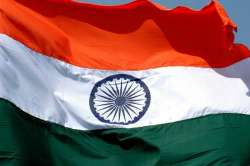India Third Most Powerful Nation: US Report
Washington: India is listed as the third most powerful country in the world after the US and China and the fourth most powerful bloc after the US, China and the European Union in a new

Washington: India is listed as the third most powerful country in the world after the US and China and the fourth most powerful bloc after the US, China and the European Union in a new official US report.
The new global power lineup for 2010 also predicted that New Delhi's clout in the world will further rise by 2025, according to "Global Governance 2025" jointly issued by the National Intelligence Council (NIC) of the US and the European Union's Institute for Security Studies (EUISS).
Using the insights of a host of experts from Brazil, Russia, India and China, among others, and fictionalised scenarios, the report illustrates what could happen over the next 25 years in terms of global governance.
In 2010, the US tops the list of powerful countries/regions, accounting for nearly 22 percent of the global power.
The US is followed by China with European Union at 16 percent and India at eight percent. India is followed by Japan, Russia and Brazil with less than five percent each.
According to this international futures model, by 2025 the power of the US, EU, Japan and Russia will decline while that of China, India and Brazil will increase, even though there will be no change in this listing.
By 2025, the US will still be the most powerful country of the world, but it will have a little over 18 percent of the global power.
The US will be closely followed by China with 16 percent, European Union with 14 percent and India with 10 per cent.
"The growing number of issues on the international agenda, and their complexity, is outpacing the ability of international organisations and national governments to cope," the report warns.
This critical turning point includes issues of climate change, ethnic and regional conflicts, new technology, and the managing of natural resources. The report also highlights the challenges proponents of effective global governance face.
On one hand, rapid globalistion, economic and otherwise, has led to an intertwining of domestic politics and international issues and fueled the need for more cooperation and more effective leadership.
But on the other hand, an increasingly multipolar world, often dominated by non-state actors, have put a snag in progress toward effectual global governance, it said.
The new global power lineup for 2010 also predicted that New Delhi's clout in the world will further rise by 2025, according to "Global Governance 2025" jointly issued by the National Intelligence Council (NIC) of the US and the European Union's Institute for Security Studies (EUISS).
Using the insights of a host of experts from Brazil, Russia, India and China, among others, and fictionalised scenarios, the report illustrates what could happen over the next 25 years in terms of global governance.
In 2010, the US tops the list of powerful countries/regions, accounting for nearly 22 percent of the global power.
The US is followed by China with European Union at 16 percent and India at eight percent. India is followed by Japan, Russia and Brazil with less than five percent each.
According to this international futures model, by 2025 the power of the US, EU, Japan and Russia will decline while that of China, India and Brazil will increase, even though there will be no change in this listing.
By 2025, the US will still be the most powerful country of the world, but it will have a little over 18 percent of the global power.
The US will be closely followed by China with 16 percent, European Union with 14 percent and India with 10 per cent.
"The growing number of issues on the international agenda, and their complexity, is outpacing the ability of international organisations and national governments to cope," the report warns.
This critical turning point includes issues of climate change, ethnic and regional conflicts, new technology, and the managing of natural resources. The report also highlights the challenges proponents of effective global governance face.
On one hand, rapid globalistion, economic and otherwise, has led to an intertwining of domestic politics and international issues and fueled the need for more cooperation and more effective leadership.
But on the other hand, an increasingly multipolar world, often dominated by non-state actors, have put a snag in progress toward effectual global governance, it said.